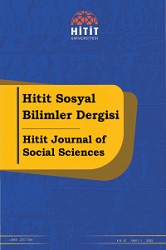Yüksek Frekanslı İşlemler Sonrası Borsa İstanbul'da Piyasa Etkinliğinin Test Edilmesi
Testing Market Efficiency in Borsa Istanbul After High Frequency Trading
Author(s): Çağrı Kaan Yalçin, Yasin Erdem Çevik, Cihan TanriövenSubject(s): Economic development, Financial Markets
Published by: Hitit Üniversitesi
Keywords: High Frequency Trading; Algorithmic Trading; Efficiency Market Hypothesis; Adaptive Market Hypothesis; Istanbul Stock Exchange; Random Walk Theory;
Summary/Abstract: With the use of high-frequency trading (hereafter HFT) in capital markets, the investment environment has changed, and it has become important to investigate HFT studies on market efficiency. It has been observed that HFT affect market efficiency due to speed and technology advantages in the markets in which they are used, and lead to the rejection of weak form market activity in short time intervals. With Borsa İstanbul's transition to the BISTECH system, HFT have been used in Turkish markets since 2016. In this study, the validity of the efficient market hypothesis in Borsa Istanbul was tested by considering HFT. To determine the weak form market efficiency, the random walk hypothesis was tested by using the variance ratio test, like the literature. As the data set, the minute returns of the BIST100 index, which is the main indicator of Borsa Istanbul, between the periods 05/02/2019 and 05/02/2020 were used. It has been observed that Borsa Istanbul is not active in weak form in minute timeframes. It has been determined that there is no random walk and stationarity in Borsa Istanbul, where HFT are used. This result indicates that it is possible to obtain returns above the market by using HFT in Borsa Istanbul.
Journal: Hitit Sosyal Bilimler Dergisi
- Issue Year: 15/2022
- Issue No: 1
- Page Range: 100-119
- Page Count: 20
- Language: Turkish

